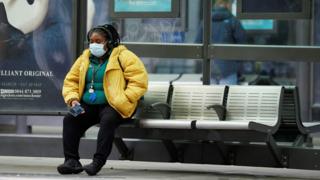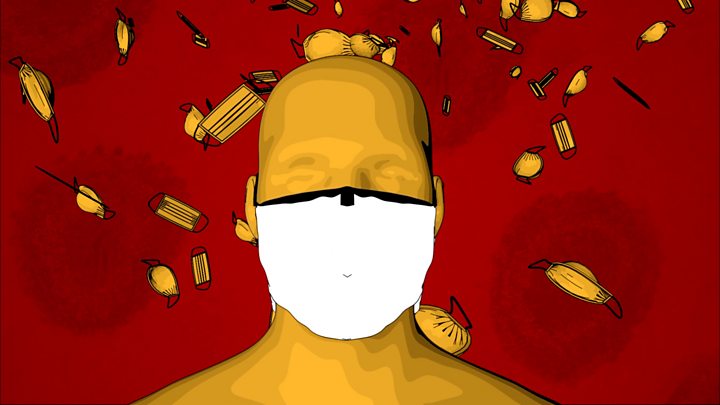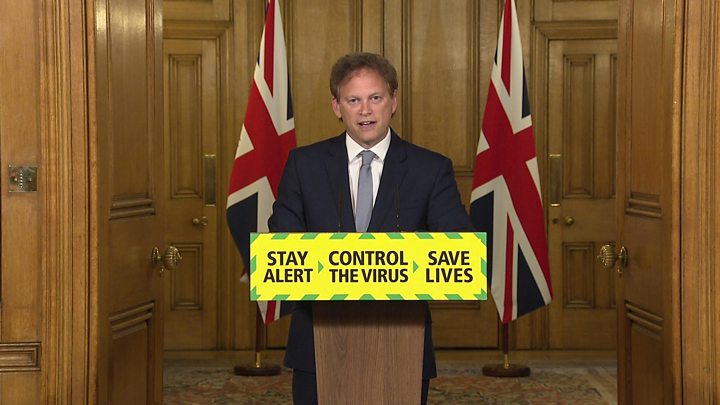Coronavirus: Widen rules on where face coverings must be used, say UK doctors
 Image copyright Reuters
Image copyright Reuters
Doctors have urged the government to make face coverings compulsory in all places where social distancing is not possible, not just on public transport.
All passengers on public transport in England must wear a covering from 15 June, the government said on Thursday.
But the British Medical Association, the doctors' union, said masks "should not be restricted" to transport.
It also said the risk from coronavirus would be "much less" if the rule started now, not later in the month.
Face coverings - which can be homemade - must be worn on buses, trams, trains, coaches, aircraft and ferries.
Passengers will not be allowed to travel without one, and if they do not wear one they could be fined.
People in Scotland and Northern Ireland are currently recommended to wear coverings in places where social distancing is more difficult. The Welsh government says it is a matter of personal choice.
Transport Secretary Grant Shapps said the new measure comes as passenger numbers are expected to increase when lockdown measures are eased further.
From 15 June in England, secondary schools and colleges will open to some students, while shops can reopen if they put social distancing rules in place.
Doctors' warning
The BMA recommended that people consider wearing masks in places where they cannot socially distance back in April.
Speaking after the government made them compulsory, BMA council chair Dr Chaand Nagpaul said: "These important measures should not be restricted to public transport but to all areas where social distancing is not always possible - the risk will be much less if the public adopts this now - not mid-June."
Dr Nagpaul also said the government should ensure the public are supplied with face coverings, as well as providing advice on how to wear them correctly.
A further 1,806 cases were confirmed in the UK on Thursday. The number of people who have died with the virus rose by 176, taking the total number of deaths to 39,904.
Earlier, Scotland's First Minister Nicola Sturgeon said her government was considering whether to make it mandatory to wear face coverings in some situations.
- PUBLIC TRANSPORT: Is it safe to travel?
- FACE MASKS: Should I be wearing one?
- RISK AT WORK: How exposed is your job?
- LOOK-UP TOOL: How many cases in your area?
- GLOBAL SPREAD: Tracking the pandemic
At the daily briefing on Thursday, Mr Shapps that people in England should wear the kind of face covering that could be made at home, to keep surgical masks for medical and care staff.
They should cover the mouth and nose and can be as simple as a scarf or bandanna tied snugly behind the head.

Transport operators will be able to issue penalty fines for those who do not follow the rules, in a similar way to people who travel without a ticket. Officers from the British Transport Police will help to enforce the measures.
Mr Shapps also stressed that social distancing and regular hand washing were still the most important measures to prevent the disease spreading.
Very young children, disabled people and those with breathing difficulties would be exempt from the face covering rule, he said.

The World Health Organization (WHO) currently says only two groups of people should wear protective masks, those who are sick and showing symptoms, or those caring for people suspected to have virus.
The WHO does not usually recommend them for the public because they can be contaminated by other people's coughs and sneezes or when putting them on or off, or they might offer a false sense of security.
But that doesn't mean they have no benefit at all for the general public - it is just that the scientific evidence is weak.
'A potentially useful extra tool'
Research on face coverings has been described as "slim" by many authorities, and for health professionals there's always been the fear of a rush to snap up medical-grade masks.
But studies in laboratories have shown not only how far droplets can be spread by coughs but also how various kinds of materials can dramatically reduce how many of those droplets do get through.
For the US government, the deciding factor was the risk of the virus being spread by people who do not realise they are carrying it.
For others, it's been a sense of altruism: A homemade mask will not do a great job of protecting you but may reduce the chances of you infecting others.
And if enough people follow that advice, the risks of the infection spreading are brought down.
There have been passionate disagreements over this within the world of science.
And even advocates would agree that the public wearing masks will not defeat the virus on its own; but it's a potentially useful extra tool as we come out of lockdown.
Unions had been pushing for compulsory face coverings after dozens of transport workers died after contracting Covid-19.
Mick Whelan, general secretary of the train drivers' union Aslef, said it was a "sensible step".
However, Mick Cash, of the Rail, Maritime and Transport union, said the new rules were "long overdue".
"We fear this announcement is being driven not by safety concerns but by the premature easing of the lockdown which is swelling passenger numbers and making social distancing on transport increasingly impossible," he said.
Shadow transport secretary Jim McMahon said it was "another example of the government being slow to act", after Labour backed London Mayor Sadiq Khan's call for face masks two months ago.
How to make your own face mask
Don't have a bandana? Click here to find out how to make other face masks.
Features
Elsewhere on the BBC
A sneak peek at your next must-see drama
I May Destroy You starring Michaela Coel
Full article A sneak peek at your next must-see dramaDaily news briefing direct to your inbox
Sign up for our newsletter
Full article Daily news briefing direct to your inboxfrom Via PakapNews